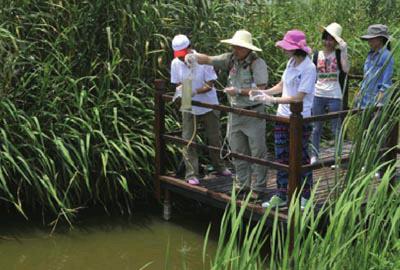Making Accommodations
2015-08-18ByWangHairong
By+Wang+Hairong
Global medical NGO Project HOPE was founded in 1958 by Dr. William B. Walsh, who once served as a medical officer in the South Pacific during World War II. Struck by the suffering of people, particularly that of children due to a lack of simple medical know-how in the region, Walsh set up the Virginia-based organization, and transformed a U.S. Navy hospital ship donated to the organization into a floating medical center that sailed to other parts of the world to provide solution to health problems, mainly through education and training.
In 1983, Project HOPE became the first international non-profit health organization to work in China. Now, it has representative offices in Beijing, Shanghai and Wuhan in Hubei Province.
Shanghai Childrens Medical Center, a top pediatric care hospital in the country, was jointly established by the Shanghai Municipal Government and Project HOPE in 1998. Project HOPE not only injected funds into the hospital and equipped it with cutting-edge medical devices but also trained medical personnel.
The center has benefited children in and out of Shanghai. For instance, every year, 3,700 children received operations for congenital heart diseases in the center, with a success rate was 97 percent, said Xu Lihua, Director of Project HOPEs Shanghai Office.
At a recent high-profile symposium involving senior government officials, national legislators and representatives of overseas NGOs operating in China, Xu said that her organization aims to give Chinese doctors an international perspective and bring advanced medical philosophy from the United States to China.
“The Chinese Government highly appreciates the active role played by overseas NGOs, and we welcome and support them in their decision to come to China to engage in friendly exchange and cooperation,” said Guo Shengkun, State Councilor and Minister of Public Security, during the event in Shanghai on July 25.
Guo added that the government will step up the management of overseas NGOs and provide them with a more convenient and better environment.
Representatives of other six overseas NGOs also attended the symposium, including the U.S.-headquartered United Way Worldwide, the UK-based China-Britain Business Council, Germany-based charity foundation Stiftung Mercator and Hong Kong-based Hong Kong-Shanghai Youth Exchange Promotion Association. They all expressed wishes to further cooperation with China and made some suggestions.
Consuls general of the United States, the United Kingdom and Germany in Shanghai were also present at the meeting.
China presence
After China implemented reform and openingup policies in the late 1970s, many overseas NGOs began to establish a presence in the country. It is estimated that about 1,000 overseas NGOs are operating in China. If those conducting short-term projects in China are added up, that number could be somewhere between 4,000 and 6,000, according to the Chinese Social Sciences Today, a newspaper affiliated with the Chinese Academy of Social Sciences.
Every year, hundreds of millions of U.S. dollars flew into China through overseas NGOs, the newspaper said. These organizations usually work in a variety of fields such as poverty alleviation, environmental protection, health and education.
Overseas NGOs have brought in fund, advanced technology and management expertise and helped China increase its science and technology capacity, improve the quality of peoples lives and develop charity, said Wang Cunkui, a professor at the Peoples Public Security University of China.
According to Wang, the development of overseas NGOs in China can be divided into three stages. The first stage was in the 1980s, when some overseas NGOs such as the World Vision, Oxfam, Salvation Army and Save the Children UK came to China, donating money and supplies to disaster-stricken areas and helping underdeveloped regions develop economy. In the meantime, Wang said that some of these organizations also disseminated Western values.
The second stage, spanning from the late 1980s to the turn of the millennium, saw the arrival of overseas environmental, child assistance and health organizations such as Green Peace and Environment Defense Fund. The political activities of overseas NGOs mostly ceased, Wang said.
In the third stage that started after Chinas accession into the World Trade Organization in 2001, overseas NGOs are mainly engaged in cultural exchanges, social relief, poverty alleviation and education assistance. Their recognition among the average Chinese people has continued to expand.
Beijing-based newspaper Global Times quoted Deng Guosheng, Director of the NGO Research Center at Tsinghua University, as saying that some overseas NGOs have come to China with political agendas involving the incitement of mass incidents or illegal activities such as fraud.
Law in the making
Since the 1980s, overseas NGOs have customarily been registered with the Ministry of Civil Affairs while there is no dedicated law governing them, said Wang Jianqin, a professor at the China University of Political Science and Law who specializes in NGOrelated legal issues.
Some overseas NGOs fall within the purview of two government regulations, namely Provisional Regulations for the Administration of Foreign Chambers of Commerce in China and the Regulations on Foundation Administration, promulgated by the State Council, Chinas cabinet, in 1989 and 2004, respectively. But those overseas NGOs that are not chambers of commerce or foundations are not regulated by law.
So far, Chinas first legislation on the administration of overseas NGOs has been deliberated twice by the Standing Committee of the National Peoples Congress (NPC), the national legislature, in December 2014 and last April.
The purpose of enacting the law is to clarify ambiguities so that overseas NGOs have legal standards to abide by, said Xu Xianming, Deputy Director of the NPCs Law Committee, at the symposium on July 25. He stressed that the new law is an important step to strengthen the rule of law in China.
The draft law stipulates that the activities of overseas NGOs operating in China should comply with Chinese law and be protected. Relevant government departments should provide guidance and convenience for overseas NGOs.
He suggested that overseas NGOs gain a deep understanding of Chinas national conditions and abide by law and their own respective charters.
Chen Xi, Director of Greater China Region at United Way Worldwide, said that his organization has been cooperating with Chinese charities since the late 1990s, and “our experience is that we always comply with Chinese law and regulations.”
